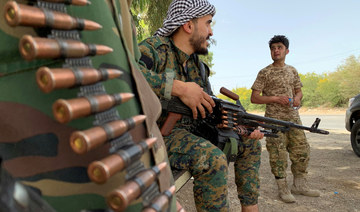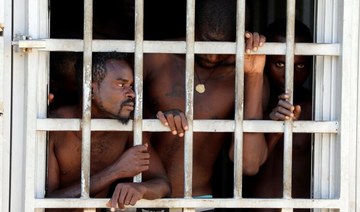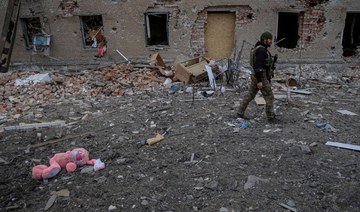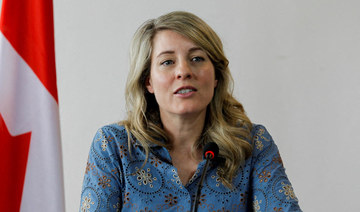ABOARD GEO BARENTS: Guards at a Libyan detention center for migrants shot and killed at least six people amid chaos in the overcrowded facility, UN officials said Saturday as they again condemned widespread abuses against migrants in the North African country.
The development comes a week after authorities rounded up more than 5,000 migrants in a massive crackdown and after UN-commissioned investigators said abuses and ill treatment of migrants in Libya amount to crimes against humanity.
The shooting took place Friday in the Mabani detention center west of the capital, Tripoli, where authorities earlier this month sent 4,187 new detainees, including 511 women and 60 children, according to the International Organization for Migration.
A spokesman for Libya’s Interior Ministry, which oversees migrant detention centers, didn’t respond to requests for comment.
It wasn’t immediately clear what triggered the violence. But Vincent Cochetel, the UN refugee agency’s special envoy for the Central Mediterranean, said “human rights violations and inhuman conditions” at Libya’s overcrowded detention centers led to the mayhem, which included “indiscriminate shooting.”
Cochetel urged the European Union and UN to impose sanctions on those implicated in the abuses against migrants, especially after the findings of UN-commissioned investigators.
“Some individuals bear special responsibility for the human rights abuses committed either because they are directly involved in them or because they cover them under their authority. It is time for the UN and the EU sanctions committee to take action and list some individuals,” he told The Associated Press.
Federico Soda, the head of IOM’s mission in Libya, said at least six migrants were shot dead by guards.
Footage circulated online purporting to show hundreds of migrants fleeing the detention center through a gap in the facility fence. Some were seen helping apparently injured fellow migrants. Other videos showed large numbers of migrants running through the streets in Tripoli.
Gabriel Akoulong, 24, of Cameroon, was among the fleeing migrants. He was detained in the crackdown in the western town of Gargaresh, a major hub for migrants in Libya, and imprisoned in Mabani.
“They put us into crowded cells where we couldn’t even breathe. There was no food, no water, no oxygen,” he said.
During the escape, some migrants fell and were caught by Libyan guards who beat them. Some of the migrants trying to flee were shot, he said.
“I still ask myself why we have been detained and imprisoned,” he told the AP in a phone interview from Tripoli where he was in hiding.
Earlier this week, many migrants attempted to flee from the Mabani center, but they were met “with extreme violence,” said medical aid group Doctors without Borders, which was granted a rare visit to the center.
The group, also known by its French acronym MSF, said its visiting team “heard two rounds of heavy gunfire at very close range and witnessed the indiscriminate beating of a group of men who were later forced into vehicles and driven to an unknown destination.”
More than 5,000 migrants were rounded up in the crackdown earlier this month, including 215 were children and more than 540 women, at least 30 of whom were pregnant, according to the IOM. The crackdown, which left one migrant dead and 15 others injured, began Oct. 1 in Gargaresh and spread to surrounding areas.
Libyan authorities described the crackdown as a security operation against illegal migration and drug trafficking. But they made no mention of any traffickers or smugglers being arrested.
Hours before Friday’s chaos in Mabani, the UN refugee agency said authorities demolished many buildings and makeshift houses for migrants during the crackdown.
“The raids ... have created widespread panic and fear among asylum seekers and refugees in the capital,” the UNHCR said. Many migrants, including unaccompanied children and young mothers, have protested at the agency’s Community Day Center in Tripoli, demanding evacuation from Libya.
The UNHCR said it temporality suspended its activities in the center after two of its workers were injured.
Libya has been engulfed in chaos since a NATO-backed uprising toppled and killed longtime dictator Muammar Qaddafi in 2011. The county has since emerged as migrant hub for those fleeing poverty and civil war in Africa and the Middle East and hoping a better life in Europe.
Thousands of migrants have been intercepted at the Mediterranean Sea and returned to Libya’s detention centers which are rife with widespread abuses, torture and sexual violence.
UN-commissioned investigators said violations against migrants at sea, in detention centers and at the hands of traffickers amount to crimes against humanity.
UN officials say guards kill 6 migrants detained in Libya
https://arab.news/m4pqx
UN officials say guards kill 6 migrants detained in Libya
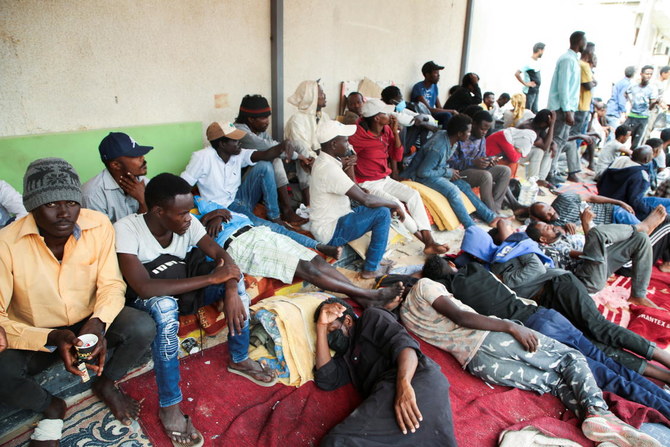
- UN-commissioned investigators said abuses and ill treatment of migrants in Libya amount to crimes against humanity
- The UN refugee agency’s special envoy for the Central Mediterranean said “human rights violations and inhuman conditions” at Libya’s overcrowded detention centers led to the mayhem
Send us Patriots: Ukraine’s battered energy plants seek air defenses against Russian attacks

- Ukraine's foreign minister has said half of the country’s energy system has been damaged by Russian attacks
- Russian President Vladimir Putin has framed the attacks as retaliation for Ukrainian strikes on Russian oil refineries
KYIV, Ukraine: At a Ukrainian power plant repeatedly hit by Russian aerial attacks, equipment department chief Oleh has a one-word answer when asked what Ukraine’s battered energy industry needs most: “Patriot.”
Ukrainian energy workers are struggling to repair the damage from intensifying airstrikes aimed at pulverizing Ukraine’s energy grid, hobbling the economy and sapping the public’s morale. Staff worry they will lose the race to prepare for winter unless allies come up with air-defense systems like the US-made Patriots to stop Russian attacks inflicting more destruction on already damaged plants.
“Rockets hit fast. Fixing takes long,” Oleh said in limited but forceful English.
The US has sent Ukraine some Patriot missile systems, and said last week it would give more after entreaties from President Volodymyr Zelensky.
The Associated Press on Thursday visited a plant owned by DTEK, the country’s biggest private energy supplier, days after a cruise-missile attack left parts of it a mess of smashed glass, shattered bricks and twisted metal. The coal-fired plant is one of four DTEK power stations struck on the same day last week.
The AP was given access on the condition that the location of the facility, technical details of the damage and workers’ full names are not published due to security concerns.
During the visit, State Emergency Service workers in hard hats and harnesses clambered atop the twisted roof of a vast building, assessing the damage and occasionally dislodging chunks of debris with a thunderous clang.
Ukrainian Foreign Minister Dmytro Kuleba told Foreign Policy magazine that half of the country’s energy system has been damaged by Russian attacks.
DTEK says it has lost 80 percent of its electricity-generating capacity in almost 180 aerial attacks since the start of Russia’s full-scale invasion in 2022. It estimates that repairing all the damaged plants would take between six months and two years — even if there are no more strikes.
Shift supervisor Ruslan was on duty in the operations room when the air alarm sounded. He sent his crew to a basement shelter but remained at his post when the blast struck only meters (yards) away.
He rushed out to darkness, dust and fire. He said he wasn’t scared because “I knew what I needed to do” – make sure his team was OK and then try to help put out the flames.
Russia pummeled Ukraine’s energy infrastructure to devastating effect during the “blackout winter” of 2022-23. In March it launched a new wave of attacks, one of which completely destroyed the Trypilska power plant near Kyiv, one of the country’s biggest.
Russian President Vladimir Putin has framed the attacks as retaliation for Ukrainian strikes on Russian oil refineries.
Oleh said the Russians are “learning all the time” and adapting their tactics. Initially they targeted transformers that distribute power; now they aim for the power-generating equipment itself, with increasing accuracy. The Russians also are sending growing numbers of missiles and exploding drones to exhaust Ukraine’s air defenses, and striking the same targets repeatedly.
DTEK executive director Dmytro Sakharuk said in March that out of 10 units the company had repaired after earlier strikes, two-thirds had been hit again.
More Russian missiles have been getting through in recent months as Ukraine awaited new supplies from allies, including a $61 billion package from the US that was held up for months by wrangling in Congress. It was finally approved in April, but it could be weeks or months before all the new weapons and ammunition arrives.
Ukraine’s energy firms have all but exhausted their finances, equipment and spare parts fixing the damage Russia has already wrought. The country’s power plants urgently need specialist equipment that Ukraine can no longer make at sufficient speed and scale.
Some 51 DTEK employees have been wounded in attacks since 2022, and three have been killed. Staff say they keep working despite the danger because they know how crucial their work is.
Machine operator Dmytro, who was on shift during the recent attack and took shelter in the basement, said that when he emerged, “my soul was bleeding when I saw the scale of the destruction.”
He thought of the many people who had poured heart and soul into building the mammoth power plant.
“This was destroyed in a few seconds, in an instant,” he said.
Dmytro, who worked at Ukraine’s Zaporizhzhia nuclear power plant before it was seized by Russia, said he would continue to show up for work every day, “as long as I’m able.”
“It’s our duty toward the country,” he said
Biden says ‘order must prevail’ during campus protests over the war in Gaza

- “Dissent is essential for democracy. But dissent must never lead to disorder,” the president said at the White House
- The Democratic president broke days of silence on the protests with his remarks amid mounting criticism from Republicans
WASHINGTON: President Joe Biden on Thursday rejected calls from student protesters to change his approach to the war in Gaza while insisting that “order must prevail” as college campuses across the country face a wave of violence, outrage and fear.
“Dissent is essential for democracy,” Biden said at the White House. “But dissent must never lead to disorder.”
The Democratic president broke days of silence on the protests with his remarks, which followed mounting criticism from Republicans who have tried to turn scenes of unrest into a campaign cudgel. By focusing on a law-and-order message while defending the right to free speech, Biden is grasping for a middle ground on an intensely divisive issue in the middle of his reelection campaign.
He largely sidestepped protesters’ demands, which have included ending US support for Israeli military operations. Asked after his remarks whether the demonstrations would prompt him to consider changing course, Biden responded with a simple “no.”
Biden said that he did not want the National Guard to be deployed to campuses. Some Republicans have called for sending in troops, an idea with a fraught history. Four students were shot and killed at Kent State University by members of the Ohio National Guard during protests over the Vietnam War in 1970.
Tensions on college campuses have been building for days as demonstrators refuse to remove encampments and administrators turn to police to clear them by force, leading to clashes that have seized widespread attention.
Biden said he rejected efforts to use the situation to “score political points,” calling the situation a “moment for clarity.”
“There’s the right to protest, but not the right to cause chaos,” Biden said shortly before leaving the White House for a trip to North Carolina. “People have the right to get an education, the right to get a degree, the right to walk across campus safely without fear of being attacked.”
The White House also maintained its focus on combating antisemitism. Doug Emhoff, husband of Vice President Kamala Harris, spoke to Jewish students and Hillel leaders on Thursday to hear about their experience with threats and hate speech, according to a White House official.
Biden will make his own visit to a college campus on May 19 when he’s scheduled to deliver the commencement address at Morehouse University in Atlanta.
His last previous public comment on the demonstrations came more than a week ago, when he condemned “antisemitic protests” and “those who don’t understand what’s going on with the Palestinians.”
The White House, which has been peppered with questions by reporters, had gone only slightly further than the president. On Wednesday, press secretary Karine Jean-Pierre said that Biden was “monitoring the situation closely” and that some demonstrations had stepped over a line that separated free speech from unlawful behavior.
“Forcibly taking over a building,” such as what happened at Columbia University in New York, “is not peaceful,” she said. “It’s just not.”
Biden’s latest remarks weren’t well received in some corners of the Democratic Party.
“We need to prevent lawlessness in society. We need to have protections against hate speech,” said a social media post from Patrick Gaspard, president of the Center for American Progress and a former White House political director under President Barack Obama. “But we need to be able to hold space for active dissent and activism that is discomforting without blanket accusations of hate and violence against all activists.”
But Biden’s team has expressed confidence that his stance appeals to the widest array of voters. It also echoes his approach to nationwide unrest after the murder of George Floyd by a police officer four years ago, a politically volatile situation in the middle of his campaign against then-President Donald Trump.
“I want to make it absolutely clear rioting is not protesting, looting is not protesting,” Biden said then in remarks that his team turned into an advertisement. “It’s lawlessness, plain and simple, and those that do it should be prosecuted.”
Biden has never been much for protests of any kind. His career in elected office began as a county official when he was only 28 years old, and he’s always espoused the political importance of compromise.
As college campuses convulsed with anger over the Vietnam War in 1968, Biden was in law school at Syracuse University.
“I’m not big on flak jackets and tie-dyed shirts,” he said years later. “You know, that’s not me.″
The White House has also maintained its focus on combating antisemitism. Doug Emhoff, husband of Vice President Kamala Harris, spoke to Jewish students and Hillel leaders on Thursday to hear about their experience with threats and hate speech, according to a White House official.
Despite the administration’s criticism of violent college protests and Biden’s refusal to heed demands to cut off US support for Israel, Republicans blame Democrats for the disorder and have used it as a backdrop for press conferences.
“We need the president of the United States to speak to the issue and say this is wrong,” House Speaker Mike Johnson, a Louisiana Republican, said on Tuesday. “What’s happening on college campuses right now is wrong.”
Johnson visited Columbia University with other members of his caucus last week. House Republicans sparred verbally with protesters while speaking to the media at George Washington University in Washington, D.C., on Wednesday.
Trump, who is running for another term as president, also criticized Biden in an interview with Sean Hannity on Fox News.
“Biden has to do something,” he said. “Biden is supposed to be the voice of our country, and it’s certainly not much of a voice. It’s a voice that nobody’s heard.”
He repeated his criticisms on Wednesday during a campaign event in Waukesha, Wisconsin.
“The radical extremists and far-left agitators are terrorizing college campuses, as you possibly noticed,” Trump said. “And Biden’s nowhere to be found. He hasn’t said anything.”
Kate Berner, who served as deputy communications director for Biden’s campaign in 2020, said Republicans already had tried the same tactic during protests over Floyd’s murder.
“People rejected that,” she said. “They saw that it was just fearmongering. They saw that it wasn’t based in reality.”
Apart from condemning antisemitism, the White House has been reluctant to directly engage on the issue.
Jean-Pierre repeatedly deflected questions during a briefing on Monday.
Asked whether protesters should be disciplined by their schools, she said “universities and colleges make their own decisions” and “we’re not going to weigh in from here.”
Pressed on whether police should be called in, she said “that’s up to the colleges and universities.”
Asked on Thursday why Biden chose to speak on the matter after police had arrested protesters at the University of California, Los Angeles and at universities in New York City, Jean-Pierre stressed instead the importance of any protests being nonviolent.
“We’ve been very consistent here,” she said. “Americans have the right to peacefully protest as long as it’s within the law and violence is not protected.”
Saudi Justice Ministry to host training conference

RIYADH: The Saudi Ministry of Justice is to hold the International Conference of Judicial Training in Riyadh from May 6-7.
The Judicial Training Center hosts the event which will see the participation of several international training institutes, centers, and experts in the field of judicial and legal training. The objective is to facilitate the exchange of experiences and deliberations on contemporary trends in the era of digital transformation.
Called “The Future of Judicial Training in the Era of Digital Transformation,” the event will delve into the prospects of training in the future. It will explore paths for enhancing training content; strategies for harnessing modern technology; artificial intelligence in judicial training; and effective methodologies for measuring the training’s impact.
Students erect pro-Palestinian encampments across major Canadian universities

- “If public disruption is the only way to get our voice heard, then we are willing to do that,” says University of Toronto protest leader
- Some Jewish groups have accused protesters of being antisemitic, but organizers said some protesters are Jewish
TORONTO: Quebec Premier Francois Legault said on Thursday the encampment at Montreal’s McGill University should be dismantled as more students erected pro-Palestinian camps across some of Canada’s largest universities, demanding they divest from groups with ties to Israel.
The Canadian protests come as police have been arresting hundreds on US campuses and the death toll in Gaza has been mounting.
While McGill had requested police intervention, law enforcement had not stepped in Thursday to clear the encampment and said in a statement Thursday evening it was monitoring the situation.
Students also set up encampments at Canadian schools including the University of Toronto, the University of British Columbia and the University of Ottawa.
“We want the camp to be dismantled. We trust the police, let them do their job,” a spokesperson for Legault said.
There was also a pro-Israel counter-protest in Montreal Thursday. The two sides were kept separate.
On Thursday morning, students at the University of Toronto set up an encampment in a fenced-off grassy space at the school’s downtown campus where some 100 protesters gathered with dozens of tents.
According to a statement from organizers the encampment will stay until the university discloses its investments, divests from any that “sustain Israeli apartheid, occupation and illegal settlement of Palestine” and ends partnerships with some Israeli academic institutions.
Israel says it does not participate in apartheid and that its assault on Gaza does not constitute genocide.
A university spokesperson told Reuters it was “in dialogue with the protesters” and that, as of midday, the encampment was “not disruptive to normal university activities.”
University of Toronto graduate student and encampment spokesperson Sara Rasikh told Reuters they will remain until their demands are met.
“If public disruption is the only way to get our voice heard, then we are willing to do that,” she said.
Some Jewish groups have accused protesters of being antisemitic. Organizers deny that charge, noting that some protesters are Jewish.
Asked to comment on the encampments, Prime Minister Justin Trudeau’s office pointed to a statement he made on Tuesday, saying “Universities are places of learning, they’re places for freedom of expression ... but that only works if people feel safe on campus. Right now ... Jewish students do not feel safe. That’s not right.”
The protests follow the deadly Oct. 7 attack on southern Israel by Hamas militants from the Gaza Strip, which killed 1,200 people and saw dozens taken hostage, and an ensuing Israeli offensive that has killed about 34,000 and created a humanitarian crisis.
Saudi energy minister attends Tashkent International Investment Forum

TASHKENT: Saudi Minister of Energy Prince Abdulaziz bin Salman on Thursday participated in the primary dialogue session at the third Tashkent International Investment Forum.
In the presence of the President of Uzbekistan Shavkat Mirziyoyev, the energy minister highlighted the distinguished relations between the two nations, emphasizing the leadership’s strong commitment to enhancing and expanding cooperation across all sectors, particularly energy.
The partnership aims to benefit both countries and their citizens.



